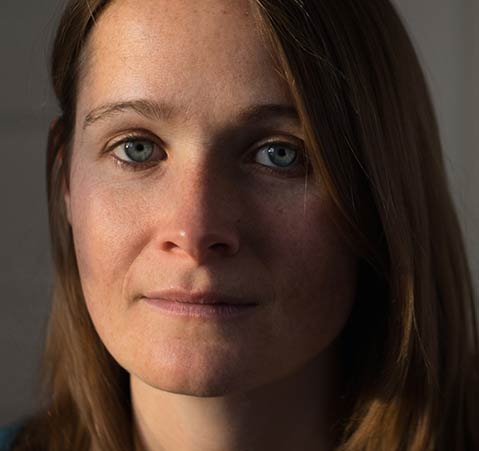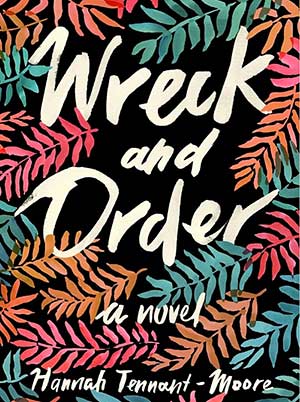How Real Is ‘Wreck and Order’?
Former ‘Indy’ Editor Hannah Tennant-Moore Discusses Her Debut Novel

About a decade or so ago, Hannah Tennant-Moore was a bubbly if occasionally biting presence in The Santa Barbara Independent newsroom, a smart and sweet editor and writer with a knack for witty sarcasm paired with a nymphish sexiness, an outward confidence, and the ability to drink most men under the table.
Her debut novel, Wreck and Order, concerns a young woman named Elsie trying to find direction and meaning in an aimless life. The book catalogs her racy and raw sexual exploits in sometimes shocking descriptions, and follows the same arc of Tennant-Moore’s own life: raised relatively privileged and intellectual on the East Coast, postcollege job as editor at a weekly beach-town paper (which she calls the Carp Times), and then time in New York City and return trips to Sri Lanka. It’s an engaging, postfeminist tale that’s getting national attention thanks to reviews (some positive, some less so) in the New York Times, New Yorker, Elle, USA Today, and more, and was even promoted by actress Sarah Jessica Parker on social media.
As a 38-year-old male who’s been lucky enough to have some sort of professional direction since college, I found Elsie’s plight a bit too full of self-pity and what-does-it-all-mean ponderings to resonate deeply. But the writing is quite poetic at times. And I was excited to congratulate her on the book and her recently announced pregnancy over the phone from her home near Bard College in New York recently, and it was great to hear her voice, sweet and sharp as ever. What follows is a streamlined version of our conversation.

Congratulations on the book and on your pregnancy! It’s really very overwhelming honestly. It’s all happening — right now.
How’s it feel to have your first novel published? It’s a huge relaxation to have a project finished and to be able to work on something new, and just to know that I am capable of writing a novel. When I started writing, that was my huge goal, to see it through to the end. I didn’t know if I would even show it to anybody. Now it feels like I can do this, and I want to do the next one better.
How much of your real life is in the plot? The circumstances are mostly from my life, but the details are pretty much made up. Of course, you know that I worked at a newspaper in Southern California, and I have spent a lot of time traveling in Sri Lanka, where I did live with a family and became very close with a young woman. But that young woman in the novel is very different from my actual Sri Lankan friend and her family, for instance. So the sense of place and the timing is similar to my life, but the details are pretty much concocted.
Did you worry about hurting people who might see themselves in the story, like your parents? Well, Elsie’s family life is almost entirely made up. I have an amazing mother. I feel like I won the mother award. Elsie’s mother has nothing to do with my mother. I originally had some of Elsie’s family life be more accurately based on my real life, but I changed that because it just wasn’t working. I feel like the way that Elsie became as I was working on the book was more and more distant from me. I realized her family life had to be more extreme to explain how messed up she is, so that was a relief for me, too. There are certain people from my past that will recognize the novel is based on real life, but even the main male characters are a composite of various people and my imagination. I feel like it was fictionalized enough. I wouldn’t want to hurt a person like that. That wouldn’t be worth it to me. That would just feel really shitty.
Were Elsie’s internal issues from your life? Definitely. That’s a good question and a good way to put it. What is autobiographical about the novel is the way Elsie’s heart and mind work. The way she acts on her thoughts and feelings is very different from the way that I have — thank god! I gave free rein to a lot of my darker thoughts and imagined what would happen if a character followed those thoughts to their most radical ends.
How’s it feel to have such national acclaim? It’s funny. There are moments when I feel joyful and wonderful and grateful for everything that’s happened along the way. But all of the public stuff is pretty difficult for me. I feel very vulnerable and exposed. I’m having to distance myself from it. For one thing, I’m not reading any of the reviews. It would be very easy to fall down an obsessive rabbit hole about this. I’m just hoping that the book will connect me to a few more people in a personal way and helps my career so that I’m able to focus on my next novel.
What is the next one? It’s completely different. It’s about a mentor-mentee relationship and Guantanamo lawyers and bisexuality. Those are the main things I’m dealing with in that book. And that’s more than I’ve said to anyone about it, other than my husband.
4.1.1:
Hannah Tennant-Moore will sign copies of Wreck and Order on Wednesday, March 23, 7 p.m., at Chaucer’s Books (3321 State St.) See hannahtennantmoore.com.



